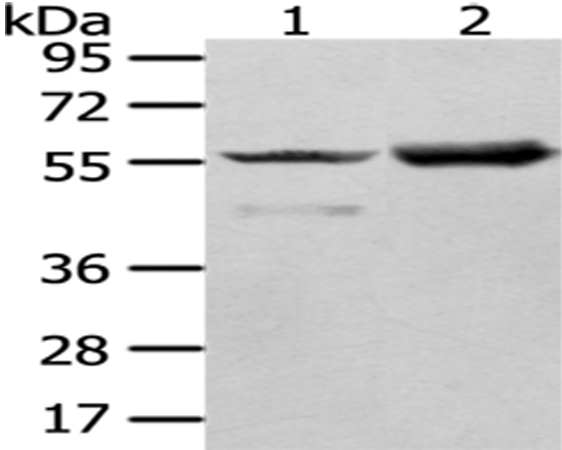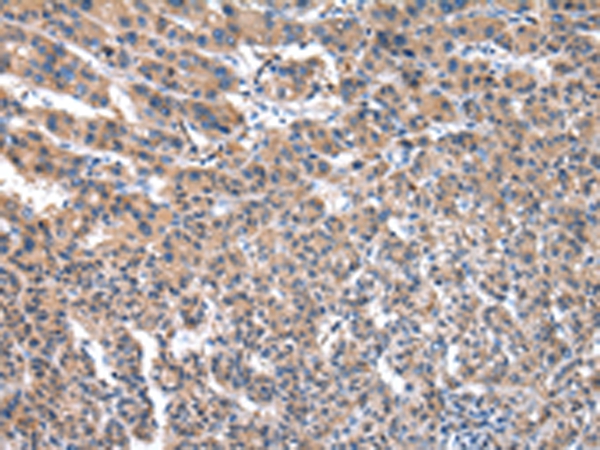


| WB | 咨询技术 | Human,Mouse,Rat |
| IF | 咨询技术 | Human,Mouse,Rat |
| IHC | 1/25-1/100 | Human,Mouse,Rat |
| ICC | 技术咨询 | Human,Mouse,Rat |
| FCM | 咨询技术 | Human,Mouse,Rat |
| Elisa | 咨询技术 | Human,Mouse,Rat |
| Aliases | SRC2; c-fgr; c-src2; p55-Fgr; p58-Fgr; p55c-fgr; p58c-fgr |
| Entrez GeneID | 2268; |
| WB Predicted band size | 59kDa |
| Host/Isotype | Rabbit IgG |
| Antibody Type | Primary antibody |
| Storage | Store at 4°C short term. Aliquot and store at -20°C long term. Avoid freeze/thaw cycles. |
| Species Reactivity | Human,Mouse |
| Immunogen | Synthetic peptide of human FGR |
| Formulation | Purified antibody in PBS with 0.05% sodium azide. |
+ +
以下是关于FGR抗体的示例参考文献(注:文献为示例性质,实际引用需核实):
1. **Smith, B. et al. (2020).**
*"Anti-Phospholipid Antibodies and Placental Dysfunction in Fetal Growth Restriction"*
摘要:探讨抗磷脂抗体(aPL)通过诱导胎盘血栓形成和炎症反应,导致胎盘灌注不足,从而引发胎儿生长受限(FGR)的机制。
2. **Lee, H. et al. (2019).**
*"sFlt-1 as a Predictive Biomarker for FGR: Role of Immunoassays"*
摘要:研究利用抗sFlt-1(可溶性fms样酪氨酸激酶-1)抗体的免疫检测方法,评估母体血液中sFlt-1水平升高与FGR的早期预测关联。
3. **Garcia, R. et al. (2021).**
*"Maternal Inflammatory Autoantibodies and Fetal Growth Outcomes"*
摘要:分析母体自身抗体(如抗核抗体)与胎盘炎症因子的相互作用,提出其可能通过干扰胎盘血管生成加重FGR风险。
4. **Johnson, L. et al. (2018).**
*"c-Fgr Tyrosine Kinase in Cellular Signaling: Antibody-Based Detection"*
摘要:基础研究类文献,聚焦c-Fgr蛋白(一种酪氨酸激酶)在肿瘤细胞迁移中的作用,利用特异性抗体揭示其表达模式及功能。
---
**提示**:若需真实文献,建议通过PubMed、Google Scholar等平台检索关键词(如"FGR antibodies"、"anti-phospholipid FGR")。若FGR指特定领域(如肿瘤学),请进一步说明以便调整方向。
FGR antibodies are immunological tools used to detect and study the FGR protein, a non-receptor tyrosine kinase encoded by the *FGR* gene (also known as *c-fgr*). This gene belongs to the SRC family kinase (SFK) group, which regulates cellular signaling pathways involved in proliferation, differentiation, and immune responses. The FGR kinase is primarily expressed in hematopoietic cells, particularly myeloid lineages, and plays roles in inflammation, phagocytosis, and pathogen defense. Dysregulation of FGR has been implicated in diseases such as leukemia, solid tumors, and chronic inflammatory conditions.
FGR antibodies are critical for investigating protein expression, localization, and activation in both normal and pathological contexts. They enable techniques like Western blotting, immunohistochemistry, and flow cytometry to assess FGR levels in biological samples. Researchers also use these antibodies to explore FGR's interactions with signaling molecules (e.g., integrins, cytokines) and its role in oncogenic pathways. Recent studies highlight FGR as a potential therapeutic target, particularly in cancers with SFK pathway alterations. However, its functional complexity—exhibiting both tumor-promoting and suppressive effects depending on context—underscores the need for precise detection tools. Commercial FGR antibodies are typically validated for specificity against human, mouse, or rat isoforms, though cross-reactivity remains a consideration. Ongoing research aims to clarify FGR's dual roles and optimize antibody-based diagnostic or therapeutic strategies.
×